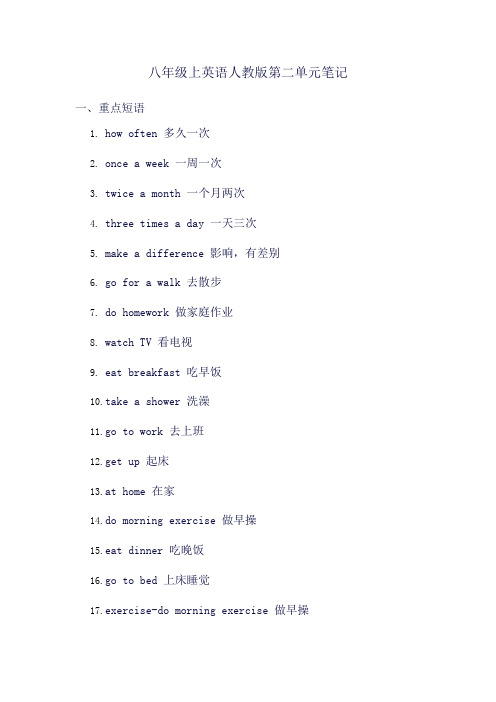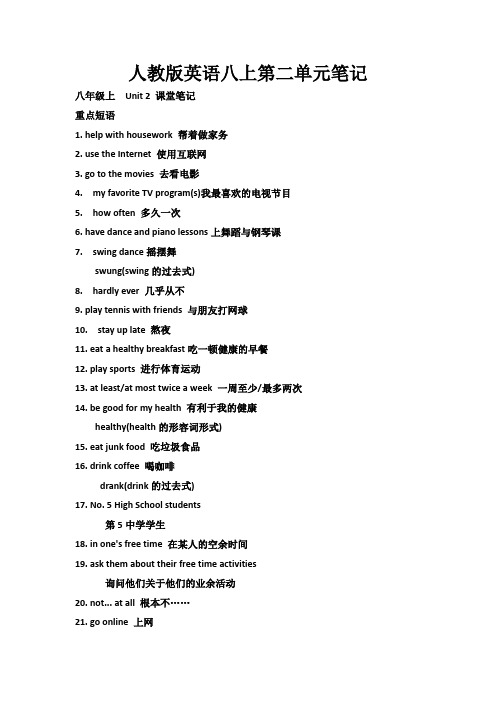英语人教版八年级上unit2 知识点笔记
八年级上英语人教版第二单元笔记

八年级上英语人教版第二单元笔记一、重点短语1.how often 多久一次2.once a week 一周一次3.twice a month 一个月两次4.three times a day 一天三次5.make a difference 影响,有差别6.go for a walk 去散步7.do homework 做家庭作业8.watch TV 看电视9.eat breakfast 吃早饭10.take a shower 洗澡11.go to work 去上班12.get up 起床13.at home 在家14.do morning exercise 做早操15.eat dinner 吃晚饭16.go to bed 上床睡觉17.exercise-do morning exercise 做早操18.keep healthy 保持健康19.do chores 做家务20.do housework 做家务二、重点句型:1.What does she do on Monday? 她星期一做什么?2.What does he do for fun? 他业余时间做什么?3.What do you do to keep healthy? 你做什么保持健康?4.What do they do on weekends? 他们周末做什么?5.What does Alice do on Tuesday evening? 爱丽丝星期二晚上做什么?三、语法重点:一般现在时1.定义:一般现在时表示通常性、规律性、习惯性的状态或者动作(有时间规律发生的事件)的一种时间状态。
2.形式:肯定形式:主语 + 动词原形(如:I go to school every day.)否定形式:主语 + don’t + 动词原形(如:I don’t go to school every day.)一般疑问句形式:Do + 主语 + 动词原形(+ 其他?)(如:Do you go to school every day?)3.用法:表示经常性或习惯性的动作,常与表示频度的时间状语连用。
人教版英语八年级上册Unit2课堂笔记

八年级上册Unit2课堂笔记一、单词1、have []v. 得(病);患(病)(1)表示“有,拥有”。
如:How many books do you have? 你有多少本书?(2)词组have to 表示“必须,不得不”。
短语:have a cold 感冒;have a headache头痛Each of the students has a Chinese English dictionary.▲“have a+疾病名”表示“患……病”。
eg:I have a headache. 我患有头痛。
类似的在本文中出现的固定表达还有:have a cold 患感冒have a headache (患)头痛have a stomachache (患)胃痛have a sore throat (患)咽喉痛have a sore back 背痛have a fever发烧have a toothache(患)牙痛have a backache 背痛1、weak []adj.(身体)虚弱的;无力的eg: He is weak so he can’t walk long. 他身体虚弱,因此他不能走很长的路。
1)weak 意为“身体虚弱的”。
2)weak 的反义词是strong。
3、hear [] v. 听见;听说1)常见短语:hear of....听说;hear from...收到……的来信,相当于get/receive a letter from...2)hear sb.do sth.听到某人做某事,hear是感官动词,后面接省去to的动词不定式。
如:I often hear the little girl sing in the next room.我经常听见这个小女孩在隔壁唱歌。
3)hear sb.doing sth.听见某人正在做某事I heard the man playing the piano when I passed.当我经过的时候,我听见那个男人正在弹钢琴。
人教版英语八年级上册 知识点笔记

人教版英语八年级上册知识点笔记
本文档是人教版英语八年级上册的知识点笔记,内容包括但不
限于以下几个部分:
Unit 1 重点知识
1. 表示时间的几种表达方法:on+具体日期、at+具体时间点、
in+时间段、every+时间段、once a week/month/year等。
2. 祈使句的用法及其五种基本句型:肯定祈使句、否定祈使句、let's句型、why not句型、would you mind句型。
3. 陈述句、疑问句、祈使句、感叹句四种句型的用法及转换。
Unit 2 重点知识
1. 过去完成时的构成及用法,表示过去已经完成的动作或状态。
2. 直接引语和间接引语的转换方法及其注意事项。
3. 一些常见的连词及其用法:although、as、because、since、when、while等。
Unit 3 重点知识
1. 现在完成时的构成及用法,表示过去发生的动作对现在造成的影响或结果。
2. 一些常见的副词及其用法:already、yet、just、never、ever 等。
3. 形容词的比较级和最高级的构成及其用法。
......
本文档只是对知识点进行简单概括,更详细的内容需要在课本和相关资料中学习和掌握。
同时,建议同学们进行课后练习和自我检测,加深对知识点的理解和记忆。
Unit2笔记人教版八年级上册英语

八年级上学期英语笔记(2)Unit 2 How often do you exercise?I. Important phrases.hardly ever 几乎从不swing dance 摇摆舞how often 多久一次once a week 每周一次twice a week 每周两次be full/free 忙的/有空surf/ use the Internet 上网How e?为什么? at least 至少,不少于at most 最多junk food 垃圾食品such as 例如more than 多于less than 少于stay up 熬夜help with sth帮助某事play sports 做运动on weekends 在周末go to the movies 看电影play puter games 玩电子游戏watch TV 看电视use the Internet 上网go to the dentist 去看牙医go shopping 去购物the most popular 最受欢迎的three times a month每月三次not......at all 一点也不have......lessons 上......课in one’s free time 在某人的空闲时间II. Grammar 频度副词1) 含义:一般用来表示动作发生的频率。
2) 一般来说可按频率大小排列为:(总是)always ﹥(通常) usually﹥(经常) often﹥(有时)sometimes﹥(几乎从不)hardly ever ﹥(从不) never3) 频度副词放在系动词、助动词或情态动词之后,行为动词之前。
eg. I never go shopping.4) 构成频率的表达方式:1. 次数(once/ twice/three times/...)+ a +时间(day/week/month/year/...)2. 次数+ every﹢基数词+时间eg. twice every three weeks once every two years3. every +时间(day,week, month, year...)4. 频度副词对以上四点提问时,一般用how often(多久一次)。
人教版英语八上第二单元笔记

人教版英语八上第二单元笔记八年级上Unit 2 课堂笔记重点短语1. help with housework 帮着做家务2. use the Internet 使用互联网3. go to the movies 去看电影4. my favorite TV program(s)我最喜欢的电视节目5. how often 多久一次6. have dance and piano lessons上舞蹈与钢琴课7. swing dance摇摆舞swung(swing的过去式)8. hardly ever 几乎从不9. play tennis with friends 与朋友打网球10. stay up late 熬夜11. eat a healthy breakfast吃一顿健康的早餐12. play sports 进行体育运动13. at least/at most twice a week 一周至少/最多两次14. be good for my health 有利于我的健康healthy(health的形容词形式)15. eat junk food 吃垃圾食品16. drink coffee 喝咖啡drank(drink的过去式)17. No. 5 High School students第5中学学生18. in one's free time 在某人的空余时间19. ask them about their free time activities询问他们关于他们的业余活动20. not... at all 根本不……21. go online 上网22. be surprised that... 感到惊讶23. use it for fun 为了取乐而使用它24. the answers to the questions 这些问题的答案25. one to three times a week 一周一到三次26. two percent of the students 2%的学生27. the best way to do sth. 做某事的最好方式28. such as 例如29. spend time with yourf riends与你的朋友共度时光spent(spend的过去式)30. spend time on sth./in doing sth.花时间在某事上/做某事31. play together 一起玩32. watch TV for over 2 hours看两个多小时电视33. go to the dentist 去看牙医34. a 16-year-old high school student一名16岁的中学生35. have a lot of good habits有许多好习惯36. more/less than two hours多/少于两小时37. go to the dentist for teeth cleaning 去牙医处清洁牙齿38. go to the shopping center去购物中心重点句型1. Next week is quite full for me.下周我的安排很满。
人教版八年级英语上册第二单元必背课文、单词、重点短语与语法梳理汇总

八年级英语上册第二单元必背课文、单词、重点短语与语法梳理汇总一、必背课文2b 文章部分《What Do No. 5 High School Students Do in Their Free Time?》Last month we asked our students about their free time activities. Our questions were about exercise, use of the Internet and watching TV. Here are the results.We found that only fifteen percent of our students exercise every day. Forty -five percent exercise four to six times a week. Twenty percent exercise only one to three times a week. And twenty percent do not exercise at all!We all know that many students often go online, but we were surprised that ninety percent of them use the Internet every day. The other ten percent use it at least three or four times a week. Most students use it for fun and not for homework.The answers to our questions about watching TV were also interesting. Only two percent of the students watch TV one to three times a week. Thirteen percent watch TV four to six times a week. And eighty - five percent watch TV every day! Although many students like to watch sports, game shows are the most popular.It is good to relax by using the Internet or watching TV, but we think the best way to relax is through exercise. It is healthy for the mind and the body. Exercise such as playing sports is fun, and you can spend time with your friends and family as you play together. And remember, “old habits die hard.” So start exercising before it's too late!这篇文章是对学生课余活动调查结果的呈现,有以下重点:-频率副词的使用:如“every day”“four to six times a week”“one to three times a week”等,生动地展示了不同活动的开展频率。
最全面人教版八年级上册英语第二单元知识点归纳总结

Unit 2 How often do you exercise?一、词汇与短语●重点单词A部分1.housework n.家务劳动;家务事2.hardly adv.几乎不;几乎没有3.ever adv.在任何时候;从来;曾4.once adv. 一次;曾经5.twice adv.两次;两倍6.Internet n.(国际)互联网;因特网7.program n.节目8.full adj.忙的;满的;充满9.swing n.摆动;秋千V. (使)摆动;摇摆10.maybe adv.大概;或许;可能11.least adv.最小;最少adj. & pron.最小的;最少的B部分1.junk n.无用的东西;无价值的东西2.health n.健康;人的身体(或精神)状态3.result n.结果;后果4.percent n.百分之…5.online adj. & adp.在线(的);联网(的)6.although conj.虽然;尽管;即使7.through prep.以;凭借;穿过8.such adj. &pron.这样的;那样的;类似的9.mind n.头脑;心智10.together adv.在一起;共同11.die v.消失;灭亡;死亡12.dentist n.牙科医生13.magazine n.杂志;期刊14.however adv.然而;不过15.almost adv.几乎;差不多16.none pron.没有一个;毫无17.point n.得分;点v.指;指向● 重点短语A部分1.how often 多久一次2.help with housework 帮助做家务3.hardly ever几乎从不4.on weekends 在周末5.once a week 每周一次6.twice a month 每月两次7.be free 有空8.go to the movies 去看电影e the Internet 用互联网10.have dance and piano lessons上舞蹈课和钢琴课11.swing dance 摇摆舞12.play tennis 打网球13.stay up late 熬夜;睡得很晚14.at least 至少;不少于;起码15.play sports 进行体育活动B部分1.junk food垃圾食品2.be good for 对…有好处3.go camping 去野营4.not …at all 一点儿也不5.go online 上网6.in one's free time 在某人的业余时间7.the best way to do sth. 做某事的最好方式8.such as例如;像这样9.more than 多于10.less than 少于● 重点句子A部分1.--What do you usually do on weekends? --I often go to the movies."在周末你通常做什么?”“我经常去看电影。
Unit2 笔记2024-2025学年人教版八年级英语上册

Unit2 How often do you exercise?1.⑴How often 多久一次,回答用表频率的副词如:①often,usually,always,sometimes,never(从不),hardly ever(很少;几乎从不),seldom(很少).②once(一次),twice(两次),three times(次) a week/year/month...③every构成的短语(如every day/week…).-How often do you exercise?-I exercise every day.often exercise.(usually) 此类副词放在实义动词前,系动词/情态动词后⑵How far 多远回答用距离或tn minutes' ride/bus...⑶How log 多久/多长时间→回答用for+段时间⑷How soon 多久以后回答用in+段时间2.housework(家务→不可数名词)→do housework做家务help with housework 帮助做家务(to)do housework3.hardly 几乎不;几乎没有(表否定) hardly ever 几乎从不hard 困难的= difficult努力地studly hard=work hard 努力学习e the Internet=go online上网on the Internet 在网上5.full 饱的(反义词) hungry满的(反义词) empty be full of…(装满…充满…)6. maybe=perhaps 或许:大概may be 或许是;或许在7.Little比较级less最高级least at least 至少更少最少8.heath(n.身体,健康)healthy(adj.健康的)unhealthy(不健康的)keep healthy=stay healthy 保持健康9.the result of……的结果as a result结果10.percent 百分之…数字+percent…(百分之…的)百分数做主语时谓语动词由of的主语确定five percent of the students are girls.thee percent of the water is clean.。
- 1、下载文档前请自行甄别文档内容的完整性,平台不提供额外的编辑、内容补充、找答案等附加服务。
- 2、"仅部分预览"的文档,不可在线预览部分如存在完整性等问题,可反馈申请退款(可完整预览的文档不适用该条件!)。
- 3、如文档侵犯您的权益,请联系客服反馈,我们会尽快为您处理(人工客服工作时间:9:00-18:30)。
Unit3 I’m more outgoing than my sister?语法讲解:1.形容词和副词的原级、比较级、最高级的构成原级变比较级的规则变化:①一般在词尾+-er,-est②以不发音的e结尾的词,在词尾+-r,-st③“_________”结尾的重读闭音节且末尾只有一个辅音字母时,双写这个辅音字母再+er,-est④以“___________+y”变y为i,再加+er,-est⑤多音节和部分双音节词,在词前+more或most(注意:)①以“ly”结尾的副词,除early外,一般加more 或most.②有些形容词有两种变化方式如:healthy---healthier---healthiest/ more healthy---most healthyfriendly----friendlier --- friendliest / more friendly ----most friendlyclever----cleverer---cleverest / more clever ----most clever原级变比较级的不规则变化:good/well---_________---___________bad/badly/ill---_________---___________many/much---_________---___________little---_________---___________far---_________---___________/---_________---___________old---_________---___________/---_________---___________写出下列形容词副词的比较级最高级important__________________ easy__________________ happy__________________ thin__________________ good__________________hot______________________ easily__________________ many__________________ nice___________________ delicious__________________few __________________ little__________________2.形容词和副词原级的用法①肯定:_________________ “…和…一样”(相当于:the same+n. as与……一个样)You are as _______ as me.你和我一样高。
He has as _________books as I (have=do).他的书和我的书一样多。
②否定_________________________“…不如…”(相当于:…less +原级+ than…“……不如/没有……”)His jacket ______ _____ _____ ______ that one.这件夹克衫没有那件便宜。
She _______ ________ ________ _________ books as I have.I don’t run so fast as you.I run ______ _______ ______ you.He doesn’t play the violin so ______ as his father.A.good B.better C.well D.best③twice/数词times +as 原级as“是……的几倍”这个房间是我的房间的两倍。
The room is ______ as _____ as mine=(my room).你的苹果是我的苹果的四倍。
________________________________.④very/quite/so /as/too/really+原级3.比较级基本句型:①…比较级+ than …“……比……更……”(than后加名词,代词或者句子)This cake is _________________ (味更美)that one.Li Lei sings ___________(比…更好)Jim.He is two years _________(比…更大)me .②“Which / Who is + 比较级, A or B?”e.g. Which T-shirt is nicer, this one or that one?③the+比较级+of the(two ): 两者中较…的一个Of the twins, she was______ ________hard-working .④比较级+and+比较级“越来越……“或more and more+原级“越来越……”e.g. They talked ______ ____ _______ loudly. 越来越大________________ 越来越好________________ 越来越多________________ 越来越少________________越来越坏________________越来越漂亮________________ 越来越有趣________________ 越来越有用________________⑤The比较级…,the+比较级…“越…就越…”The _______________ (exercise) you do, the ___________(strong) you’ll be.⑥比较级常与much, even, far, than, a little, a bit, a lot 等连用.(注意:)①常用_______代单数可数名词,____________代替复数名词,__________代替不可数名词/可数名词单数.e.g. The book here is newer than ______ ________ on the desk.The apples on the tree are fresher than ________ in the box.The weather in Wuhan is hotter than________ in Beijing.②必须是同类事物之间的比较。
My house is much cleaner than _______.(=____ ______)Peter is tall than Mike.He speak English better than I(do).He speak English better than me.(习惯用法)③比较级前可用“数词+名词”表示确定的度量。
e.g. I am (5 years) older than him.The room is (3 times) as large as that one.单词讲解We ________ girls. A.are both B.. both areWe ________ apples. A. both like B. likeboth考点二:both... and..."…和…两个都"、、"既…又…"连接两个主语时谓语用___数。
Both she and I ______ going to do the cleaning. A.am B.is C.are D.be2.aloud, loud ,loudly 辨析① aloud 强调发出的声音能被听见,意思为“出声地”或“大声地”,常用read ,call 等动词连用。
例如:Please read the text aloud.② loud 意为“响亮地”、“大声”或“高声地”,侧重发出的音量大,传得远,常用speak ,talk ,laugh 等动词。
loud 还可用作形容词。
例如:Speak ________, please, or no one will hear you. 请大声些,否则没人能听见。
③ loudly 意为“响亮地”,常与ring ,knock 等动词连用。
loudly 放在动词前后均可,含有“喧闹”或“嘈杂”的意味。
例如:Suddenly the bell on the wall rang loudly. 突然,墙上的铃大声地响起来。
3.which“_______”,指_______.(人/物)当pron.时,_______ is Sam’s book?当adj.时,_______ _______ is Sam’s book?讲述:tell a story/lie/joke.4. tell 告诉:tell sb. sth.= tell sth. to sb. ; tell sb. (not) to do sth.辨别;识别:Can you tell the ________(不同点) between the twins?5 .though意为“然而;但是”,表示转折关系,常放于句尾,用逗号隔开; however可位于句首、句中或句末,常用逗号隔开。
But位于句首“但是”。
6.talented adj.“有才能的”短语:be talented in“在…方面有天赋”后面接______________ talent n. “才能”短语:have a talent for “有…天赋”7.the same as…意为“和……一样”I have the same height as you.the same……as……“和……一样的”My height is the same as yours.8.care v.在意;担忧I don’t care what happens.__________adj. “小心的”___________adv. “小心地”___________adj. “粗心的”____________adv. “粗心地”短语:Take care! 当心/保重care about: 关心;在意He doesn’t care about anything people say.take care of=care for 关心;照顾或look after①(使)破裂,碎,损坏I ______ the window yesterday.The glass ________.玻璃碎了。
②(+身体部分)弄破③n. 暂停;休息短语:______________休息break down 出故障他们的车出故障了。
